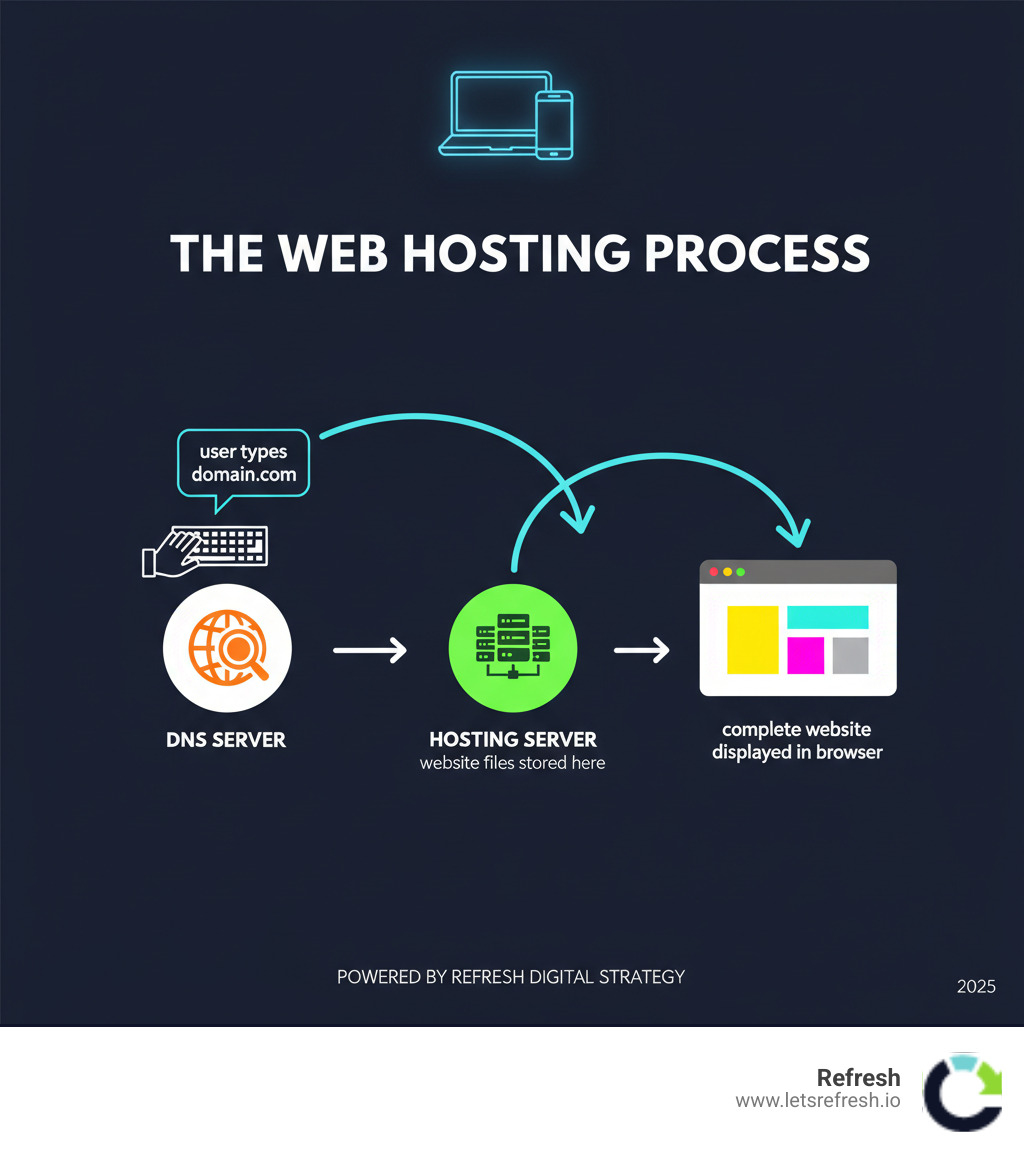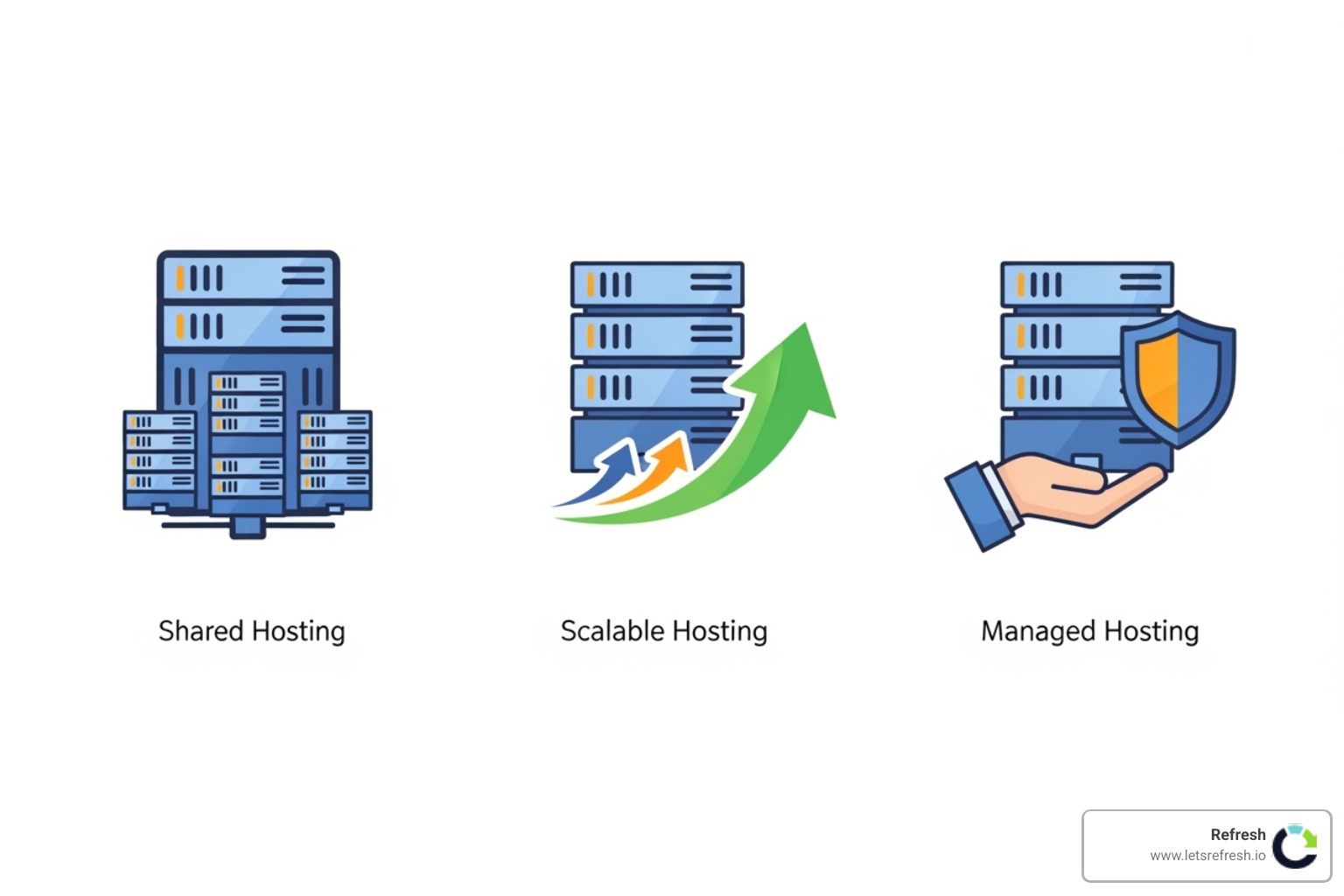Why Website Hosting for Small Business is Critical to Your Success
Website Hosting for Small Business is the foundation that keeps your website accessible, fast, and secure. Without reliable hosting, your business risks losing customers to slow load times, security breaches, or website downtime.
Quick Answer: The Best Website Hosting for Small Business Options:
- Shared Hosting ($2-$3/mo): Perfect for new websites with low traffic
- Scalable Hosting ($5-$15/mo): Ideal for growing businesses with moderate traffic
- Managed Hosting ($15-$50/mo): Best for high-traffic sites needing expert support
- Key Features to Prioritize: 99.9%+ uptime, free SSL, daily backups, 24/7 support
As one small business owner found: "My heart sank when I woke up one day and found my site down... again." This painful experience highlights why choosing the right hosting provider isn't just about price—it's about protecting your business reputation and revenue.
Your hosting choice directly impacts:
- Website speed (affecting customer experience and Google rankings)
- Security (protecting customer data and business information)
- Reliability (ensuring your site stays online when customers need it)
- Scalability (supporting business growth without technical headaches)
I'm Alexander Palmiere. Having developed over 200 websites at Refresh Digital Strategy, I've seen how the right Website Hosting for Small Business can make or break online success. This guide will help you steer the hosting landscape and choose a solution that grows with your business.

Understanding the Different Types of Web Hosting
Choosing Website Hosting for Small Business is like finding a home for your company online. Your choice should match where your business is today and where it's headed tomorrow.

Your hosting type determines how server resources (CPU, memory, storage) are allocated, which affects your site's speed, traffic handling, and security. Let's explore the three main options.
Shared Hosting
Shared hosting is like an apartment building: your website lives on a server with hundreds of other sites, all sharing the same resources.
This setup makes shared hosting incredibly affordable, typically running just $2-$3 per month. It's perfect for new websites with low traffic, small business blogs, or anyone testing their first online presence.
The provider handles all technical maintenance, and you get easy-to-use control panels and one-click installers, making setup a breeze even for non-coders.
The trade-off is performance. A traffic surge on another site can slow yours down. You also have limited customization options and less control over your environment.
For most small businesses just starting, shared hosting provides excellent value. It's reliable, affordable, and gets you online quickly without technical headaches.
Scalable Hosting Solutions
As your business grows, you'll need more space and control. Scalable solutions like VPS (Virtual Private Server) and Cloud Hosting are the next step up, like moving from an apartment to a townhouse.
Designed for growing businesses with moderate to high traffic, these options offer guaranteed resources. VPS gives you a dedicated slice of a server, while Cloud hosting spreads your site across multiple servers for maximum reliability.
The performance boost is immediately noticeable. Your website loads faster and handles traffic spikes much better because you're not competing for resources. If one server in a cloud setup has issues, others seamlessly take over.
Scalability is the real superpower here. You can scale resources up or down instantly, meaning you only pay for what you need. This flexible resource allocation is perfect for seasonal businesses.
The main considerations are cost and complexity. These options cost more than shared hosting, and unmanaged VPS requires some technical skill, though managed options are available.
Managed Hosting
Managed hosting is like having a dedicated IT team for your website, letting you focus on your business. It's ideal for high-traffic websites, e-commerce stores, and owners who'd rather not troubleshoot server issues.
The time savings are transformative. You can stop worrying about backups, security patches, or caching and rely on your provider's expert support team who knows your platform inside and out.
Security and performance are typically top-notch. Providers implement advanced security measures, proactive monitoring, and performance optimizations that are difficult to manage independently. They can also handle traffic spikes automatically by scaling resources as needed.
The trade-off is cost and control. It's the most expensive option, and you have less direct control over server settings. However, for many businesses, the peace of mind and time savings are worth the investment.
When evaluating your options, consider where your business is today and where you want it to be. The right Website Hosting for Small Business grows with you, providing a foundation for success without breaking your budget.
Key Features to Look for in Website Hosting for Small Business
Choosing the right Website Hosting for Small Business isn't just about price. It's about finding features that support your business goals, much like choosing a car based on reliability and safety, not just the sticker price.
Let's explore the features you should prioritize when evaluating hosting providers. For more detailed insights, check out our guide on Good Web Hosting for Small Business.
Performance: Speed and Uptime
Website speed is a business necessity. Delays cost customers, and downtime damages trust. Poor hosting can lead to thousands in lost sales.
When evaluating performance, start with the uptime guarantee. Look for providers offering 99.9% uptime or higher. While 99.9% uptime equals about 8 hours of downtime per year, 99.5% means 44 hours—potentially days of lost business.
Storage type also makes a huge difference. NVMe storage is significantly faster than older SSDs. Many modern hosts offer NVMe as standard, and the speed boost is noticeable.
Server locations matter. If your customers are in Chicago but your server is in London, every page load travels thousands of miles. Choose a provider with data centers close to your audience or one that offers a Content Delivery Network (CDN). A CDN stores copies of your site on servers worldwide, ensuring fast loading for all visitors.
Don't overlook caching technologies. Systems like LiteSpeed Cache can dramatically speed up your site for returning visitors.
For more detailed strategies on speeding up your site, explore our article on Maximizing Website Performance Tips and Best Practices.
Security: Protecting Your Business and Customers
Small businesses are frequent targets for hackers. Your hosting provider can be your strongest ally in keeping your website secure.
A free SSL certificate is non-negotiable. It encrypts data (the "https" in your URL) and is essential for SEO and customer trust. Most reputable hosts include it for free.
Daily automatic backups are your insurance policy. Whether it's a hack, a plugin conflict, or human error, recent backups let you restore your site quickly. Look for hosts that store backups in multiple locations.
A Web Application Firewall (WAF) acts as a security guard, filtering malicious traffic. Combined with malware scanning and removal, these tools catch threats before they cause damage.
DDoS protection prevents attacks that try to overwhelm your site with fake traffic, keeping it accessible to legitimate visitors.
Customer Support
Things will eventually go wrong with web hosting. Quality customer support can be the difference between a minor hiccup and a major crisis.
24/7 availability is crucial. When your site goes down during a big sale, you need immediate help. Technical problems don't keep business hours, and neither should support.
Look for providers that offer multiple support channels like live chat, phone, and email. The best hosts also maintain extensive knowledge bases and tutorials.
Expert knowledge separates good support from great support. You want technicians who understand the unique challenges of small businesses, not just servers and databases.
Response time is crucial, but resolution time is more important. Look for providers that prioritize fixing issues, not just acknowledging them.
For a deeper dive into what makes support excellent, see our article on Best Website Hosting for Support.
Pricing, Renewals, and Value
While budgets are tight, the cheapest hosting can be costly in the long run due to lost sales from poor performance. Smart Website Hosting for Small Business decisions focus on value, not just price.
The biggest trap is the difference between introductory and renewal rates. A cheap initial plan might triple in price after the first year. Always check the renewal price before signing up; it's the real cost of your hosting.
A money-back guarantee of 30-45 days gives you time to test the service risk-free. This is important since you can't evaluate performance or support until you're using the service.
Many hosts include a free domain for the first year, which saves you $10-15 and simplifies setup.
Watch out for hidden fees like VAT or GST that get added at checkout. These are often legally required but can be a surprise. Reputable hosts are transparent about these additional costs.
Value trumps price. Paying $20 per month for hosting that keeps your site fast and secure is much better than paying $5 per month for hosting that costs you customers. The additional features and peace of mind are often worth the investment.
For more insights into budget-friendly options that don't sacrifice quality, consult our article on Affordable Web Hosting Company.
A Review of Hosting Options for Small Business
Now that we've explored the different types of hosting, let's put it all together. This Website Hosting for Small Business comparison guide will help you match your specific needs with the right solution.
The table below breaks down the key differences between shared, scalable, and managed hosting. Use it as a starting point, but remember the "best" choice depends on your unique business.
| Feature / Hosting Type | Shared Hosting | Scalable Hosting (VPS/Cloud) | Managed Hosting |
|---|---|---|---|
| Best For | New/small sites, blogs | Growing businesses, e-commerce | High-traffic sites, complex applications, businesses without IT staff |
| Cost (Monthly Avg.) | $2 - $10 | $10 - $50 | $20 - $200+ |
| Performance | Basic, can be slow with traffic spikes | Good, dedicated or distributed resources | Excellent, optimized for speed and specific platforms |
| Uptime | Varies, can be affected by neighbors | High, often with redundancy | Very High, often with proactive monitoring |
| Control | Limited | Moderate to High | Limited (provider handles technicals) |
| Technical Skill Req. | Low | Moderate | Low (provider handles technicals) |
| Scalability | Limited | High, on-demand resource adjustment | High, often with auto-scaling features |
| Security | Basic, shared environment | Good, isolated environment | Excellent, proactive management & advanced tools |
| Support | General | General to Specialized | Highly Specialized, often 24/7 expert |
| Maintenance | Provider | User (VPS) or Provider (Managed VPS/Cloud) | Provider (all aspects) |
| Examples | Bluehost Basic, Hostinger Premium | ScalaHosting VPS, Liquid Web Cloud VPS, SiteGround Cloud | WP Engine, Hostinger Managed WordPress |
Many small businesses underestimate their hosting needs, then scramble to upgrade later. Modern hosting lets you start small and grow, but it's wise to plan for the future.
For more comprehensive insights, check out our guide on Best Website Hosting for Small Business.
Hosting Optimized for Popular Platforms
If you use a popular platform like WordPress, platform-optimized hosting is a game-changer.

This hosting takes the guesswork out of technical management. The host handles automatic updates for your CMS, plugins, and themes, reducing security risks from outdated software.
The improved security is custom to your platform's vulnerabilities. For example, WordPress-specific firewalls understand what suspicious activity looks like on a WordPress site.
When issues arise, having expert support who knows your platform is invaluable. You'll talk to specialists, not general support agents.
Caching plugins often come pre-installed and configured. LiteSpeed Cache for WordPress, for example, can dramatically improve site speed without you needing to touch the technical details.
Staging environments let you safely test changes on a copy of your live site before pushing anything public.
Bluehost is officially recommended by WordPress.org, and Hostinger provides managed WordPress hosting with helpful AI tools.
For deeper insights into platform-specific options, explore our guide on Platform Hosting and Support.
Hosting with Website Builders
If you need to get online fast, hosting with an integrated website builder is a great option.
Modern builders offer remarkable ease of use for non-tech users. Drag-and-drop interfaces let you design visually. Hostinger's hPanel, for example, is praised for being intuitive.
Content generation tools powered by AI are game-changers. Bluehost's AI-powered builder helps create professional designs, while Hostinger's can generate content and layouts. Users report building basic sites in just a few hours, praising the intuitive interfaces.
The integration with hosting panel means you manage everything from one dashboard, with no need to connect third-party services.
How to Choose the Right Website Hosting for Your Small Business
The decision to choose a host comes down to a few key questions. Be honest about what your business needs right now, not what you hope it will become.
- What's your realistic budget? Introductory pricing often doubles or triples at renewal.
- What's your expected website traffic? A local service site has different needs than a national e-commerce store.
- What's your technical comfort level? If you prefer a hands-off approach, managed hosting is for you.
- What type of business are you running? An e-commerce store needs more power and security than a simple portfolio site.
- Which features are non-negotiable? Prioritize what matters most, whether it's 24/7 phone support or advanced security.
Match your answers to the hosting types we've discussed and read reviews from other small business owners. SiteGround's 4.8-star rating on Trustpilot from over 23,000 reviews, for example, tells a story about real user experiences.
How to Migrate Your Website to a New Host
Moving your website can seem daunting, but modern hosts have made the process painless. Don't let fear of migration keep you with a bad provider.
Start by creating comprehensive backups of your website files, databases, and email accounts. This is your insurance policy.
Most quality hosts offer free provider migration services. For example, Hostinger provides free migration with no downtime. It's in their interest to make your switch seamless.
After the move, you'll need to update DNS and nameservers. These tell browsers where to find your website. Your new host will provide the details to update with your domain registrar. You can learn more about how this works at Nameservers.
Test everything thoroughly before canceling your old hosting. Check every page, form, and function. Only when you're completely satisfied should you close your old account.
Frequently Asked Questions about Small Business Hosting
When you're running a small business, choosing the right hosting can feel overwhelming. These are the questions we hear most often from business owners.
How much should a small business pay for web hosting?
The cost depends on your needs, but quality Website Hosting for Small Business is affordable.
- Shared hosting is where most small businesses start. At $2-$10 per month, it's budget-friendly and perfect for new or low-traffic sites.
- Platform-optimized hosting for platforms like WordPress typically runs $10-$30 per month. This gives you automatic updates, better security, and faster speeds.
- Scalable hosting (VPS or cloud) starts around $15-$50 per month for growing businesses that need guaranteed resources and high availability.
Crucially, introductory rates aren't forever. A cheap plan might triple on renewal. Always check the renewal price and budget for the long-term cost.
We advise clients to prioritize value over price. A slightly more expensive plan with better uptime and support can prevent costly downtime and save you money in the long run.
Do I need managed hosting for my small business?
This comes down to a simple question: How do you want to spend your time?
If you're comfortable with server management and troubleshooting, regular hosting is fine. If you'd rather focus on your business while an expert handles the technical work, managed hosting is a great choice.
Managed hosting is about buying back your time. The hosting company takes care of security, backups, performance optimization, and monitoring.
The technical expertise factor is huge. Managed hosting means you don't need to be a tech expert to have a professional, secure website.
The benefits include improved security, automatic updates, expert support, and better performance. Yes, it costs more, but many small business owners find the peace of mind and time savings worth every penny. As one business owner put it, managed hosting lets you "focus on growth instead of technical headaches."
For a deeper dive, check out our guide on Managed Hosting Benefits.
What is the difference between a domain name and web hosting?
This common point of confusion is simple when you think of it like a house.
Your domain name (e.g., yourbusiness.com) is your street address on the internet. It's how people find you.
Web hosting is the actual house (the server) that stores your website's files and content. Without hosting, your domain is just an empty address.
You need both for a working website. A domain without hosting is an empty lot; hosting without a domain is a house with no address.
Many hosting providers make this easy by offering a free domain name for your first year when you sign up, bundling both essentials together.
Conclusion
Choosing Website Hosting for Small Business can feel overwhelming, but it's a critical investment in your company's digital future. Your choice will either support your growth or hold you back.
Think of hosting as your website's foundation. It needs to be rock-solid. Performance keeps customers happy, security protects your reputation, support saves you stress, and understanding renewal costs protects your budget.
Today's hosting market has an option for everyone. Whether you need a $3 shared plan or managed hosting for peace of mind, you now have the knowledge to choose wisely.
At Refresh Digital Strategy, we've seen that a strong online presence starts with the fundamentals. We help businesses build effective digital strategies, specializing in SEO, branding, and expert Webflow development, all built on a solid hosting foundation.
Your website is your 24/7 sales team and brand ambassador. Choosing reliable Website Hosting for Small Business is a strategic business decision, not just a technical one.
Want to understand how hosting fits into your bigger picture? Our article on The Importance of a Strong Digital Strategy for Small to Medium-Sized Businesses shows you how all the pieces connect.
Ready to build something amazing? We'd love to help you create a digital presence that grows with your business.
Get expert guidance on your digital strategy and website needs




.avif)


